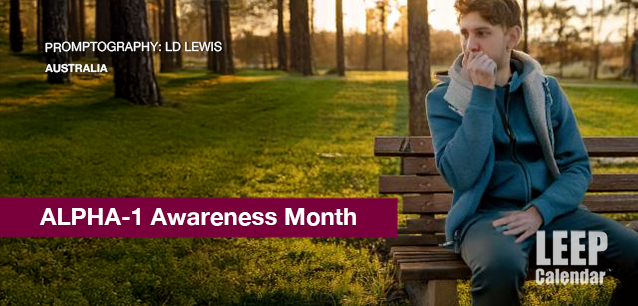 AD
AD
Today is: December 23
Scroll to explore events active on this date.
Additional Events on LEEP
LEEP INK FEATURES

August? Absolutely!
In August, we live through the Dog Days of Summer. It's hot and often humid, and those who can leave for better climates do. Down south, winter is in full force. August is also known as "the ...

In The Heat of July: July 2025 Events
Is it hot enough (or cold enough if you're below the equator) for you yet? There is actually a day for that! Like every month, I pick a diverse collection of events you may or may not know about. This ...

May Blooms: Events in May 2025
Along with October, May is one of the most densely packed months of the year. It's before the summer humidity and the last whole month of the school year. The weather is warming in t...
About ALPHA-1, Antitrypsin Deficiency Awareness Month
Australia
Ends: Nov 30, 2025
DESCRIPTION:
RAISING AWARENESS OF A DEADLY GENETIC DISEASE
ALPHA-1 AWARENESS MONTH
ALPHA-1 Awareness Month seeks to raise awareness about Alpha-1 Antitrypsin Deficiency (AATD) and encourage people to get tested early if the disease runs in their family.
AATD is a genetic disorder that affects the production of alpha-1 antitrypsin (AAT), a protein primarily made in the liver. AAT helps protect the lungs from damage caused by inflammation and infection. When someone has AATD, their body produces too little protein or an abnormal form that cannot function properly. This deficiency can lead to lung diseases like chronic obstructive pulmonary disease (COPD) or emphysema and, in some cases, liver disease.
WHO IS AT RISK OF AATD?
AATD is an inherited condition, meaning individuals inherit defective genes from their parents. To develop the disorder, a person must inherit two faulty copies of the AAT gene (one from each parent). People with one defective gene copy are carriers and may have mild or no symptoms but can pass the gene to their children.
AATD is most commonly seen in people of European ancestry, especially Northern European descendants. Individuals with a family history of lung or liver diseases may also be at higher risk.
There is currently no cure for Alpha-1 Antitrypsin Deficiency. However, early diagnosis and appropriate management can help slow the progression of the disease and reduce complications. Treatments focus on managing symptoms, preventing further lung damage, and improving the quality of life.
WHAT ARE THE SYMPTOMS OF AATD?
The symptoms of AATD can vary widely depending on whether the lungs or liver are primarily affected:
—Lung Symptoms:
Shortness of breath, Wheezing, Chronic cough, Frequent respiratory infections, Fatigue
In severe cases, development of emphysema at a younger age (often before 40), even without smoking
—Liver Symptoms:
Jaundice (yellowing of the skin and eyes), Abdominal swelling, Fatigue, Enlarged liver, Cirrhosis (scarring of the liver), and liver failure in some cases.
Some individuals with AATD may develop liver problems in childhood (e.g., neonatal jaundice) or later in adulthood.
TREATMENT
Treatment for AATD depends on the severity and the organs affected, primarily focusing on managing symptoms and preventing further damage:
—Lung-related treatments:
a) Bronchodilators and inhaled corticosteroids to help open airways and reduce inflammation
b) Oxygen therapy for those with severe lung disease
c) Pulmonary rehabilitation programs that include exercise and breathing techniques
d) Augmentation therapy, patients receive infusions of alpha-1 antitrypsin protein derived from donor blood plasma. In some cases, this can slow the progression of lung disease.
—Liver-related treatments:
a) Regular monitoring for liver function
b) Liver transplantation in severe cases of cirrhosis or liver failure
—Lifestyle changes:
a) Smoking cessation is crucial, as smoking worsens lung damage in people with AATD.
b) Avoiding exposure to lung irritants, such as dust or chemical fumes, is also essential.
c) Maintaining a healthy lifestyle with regular exercise, good nutrition, and avoiding excessive alcohol consumption.
Early diagnosis and treatment can help manage the disease and improve long-term outcomes. Testing for AATD is recommended for anyone with early-onset emphysema, unexplained liver disease, or a family history of AATD.
VIDEOS
SUPPORTING DOCUMENTS
Currently, this event does not have supporting documents.
ADDITIONAL IMAGES
Currently, this event does not have supporting images.
Where would you like to go now?
 AD
AD


/footer-logo.svg)
